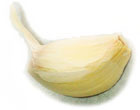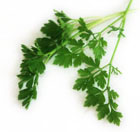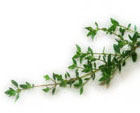Recipe
GOODNESS
 Carrots:
We all know that carrots are good for your eyes, but did you know they have anti-cancer properties as well? They have the nicely named carotenoids that are antioxidents -- chemicals that mop up the damage that results from ordinary metabolism. That, in turn, helps to keep your cells from turning rogue and hanging with the cancer gangs. If that's not enough to make you grab a carrot, they turn out to be immune-system stimulators as well, meaning you'll have fewer occasions to ask "What's up, doc?" Yes there's a little sugar in them, but also a lot of fiber to buffer it, so only the most sugar-restricted people should worry. By the way, the vitamin K in carrots is easier to absorb if you eat them with a bit of oil or fat, like a dip. Carrots:
We all know that carrots are good for your eyes, but did you know they have anti-cancer properties as well? They have the nicely named carotenoids that are antioxidents -- chemicals that mop up the damage that results from ordinary metabolism. That, in turn, helps to keep your cells from turning rogue and hanging with the cancer gangs. If that's not enough to make you grab a carrot, they turn out to be immune-system stimulators as well, meaning you'll have fewer occasions to ask "What's up, doc?" Yes there's a little sugar in them, but also a lot of fiber to buffer it, so only the most sugar-restricted people should worry. By the way, the vitamin K in carrots is easier to absorb if you eat them with a bit of oil or fat, like a dip. |
 Garlic:
Garlic is in the same family as onions and leeks, and purportedly provided ancient Roman soldiers the courage to battle the barbarians.
Whether or not it gives you courage, it is known to lower blood pressure, which is great for your heart and helps prevent stroke.
In addition, it has a long history as a digestive aid, so don't be shy with this wonderful herb, no matter what it does to your breath!
Garlic:
Garlic is in the same family as onions and leeks, and purportedly provided ancient Roman soldiers the courage to battle the barbarians.
Whether or not it gives you courage, it is known to lower blood pressure, which is great for your heart and helps prevent stroke.
In addition, it has a long history as a digestive aid, so don't be shy with this wonderful herb, no matter what it does to your breath! |
 Parsley:
This refreshing herb is good for your breath and is apparently refreshing to the rest of your body. Like all green herbs, it is loaded with chlorophyll, which is just good for people. It helps you build tissue and fight inflammation. It has even been shown to help manage blood sugars and helps to keep your weight in check. More studies are needed, but it may even help to fight cancer. All that, and a breath freshener too? Who could ask for more?
Parsley:
This refreshing herb is good for your breath and is apparently refreshing to the rest of your body. Like all green herbs, it is loaded with chlorophyll, which is just good for people. It helps you build tissue and fight inflammation. It has even been shown to help manage blood sugars and helps to keep your weight in check. More studies are needed, but it may even help to fight cancer. All that, and a breath freshener too? Who could ask for more? |
 Thyme:
This aromatic herb has anti-inflammatory and anti-oxidant properties and contains thymol, a well-known antiseptic (you might be gargling with it). It's good for the digestion and is supposed to have some aphrodisiac qualities, although that just may be be due to the well-known connection between love and good food.
Thyme:
This aromatic herb has anti-inflammatory and anti-oxidant properties and contains thymol, a well-known antiseptic (you might be gargling with it). It's good for the digestion and is supposed to have some aphrodisiac qualities, although that just may be be due to the well-known connection between love and good food. |
ADVERTISEMENT
Help • Site Map • About Us • Contact Us • Privacy Policy • Press Center
Spice Plan™ Copyright © 2009 by Scott Charles Anderson. All rights reserved.